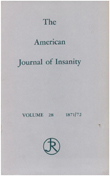Results of the DSM-IV mood disorders field trial
Abstract
OBJECTIVE: The DSM-IV mood disorders field trial, a multisite collaborative study, was designed to explore the reliability of a course-based diagnostic classification system for major depression, evaluate the symptom criteria for dysthymia, and explore the need for additional diagnostic categories for milder forms of mood disorder (e.g., minor and recurrent brief depression). METHOD: Five hundred twenty-four depressed subjects were recruited from inpatient, outpatient, and community settings at five sites and evaluated with structured interviews according to DSM-III and DSM-III-R criteria, with careful attention to longitudinal course. Within- and across-site interrater reliability studies and 6-month test-retest reliability studies were also conducted on subsets of the sample. RESULTS: For evaluations of major depression and dysthymia, intrasite reliability was good to excellent and intersite reliability was fair to good; 6- month test-retest reliability was fair for dysthymia and poor to fair for major depression. Interrater reliability for six course of illness specifiers was fair to good, and almost all subjects could be assigned to a specific type of course. CONCLUSIONS: The results supported the use of a course-based classification system for major depression. They also suggested that the content validity of the DSM-III-R symptom criteria for dysthymia could be improved by emphasizing cognitive and social/motivational symptoms, although such changes are unlikely to sharpen the distinction between dysthymia and major depression. Finally, 91% of the subjects met the criteria for current or lifetime major depression or dysthymia, suggesting that additional categories for milder forms of depression are not needed.
Access content
To read the fulltext, please use one of the options below to sign in or purchase access.- Personal login
- Institutional Login
- Sign in via OpenAthens
- Register for access
-
Please login/register if you wish to pair your device and check access availability.
Not a subscriber?
PsychiatryOnline subscription options offer access to the DSM-5 library, books, journals, CME, and patient resources. This all-in-one virtual library provides psychiatrists and mental health professionals with key resources for diagnosis, treatment, research, and professional development.
Need more help? PsychiatryOnline Customer Service may be reached by emailing [email protected] or by calling 800-368-5777 (in the U.S.) or 703-907-7322 (outside the U.S.).



